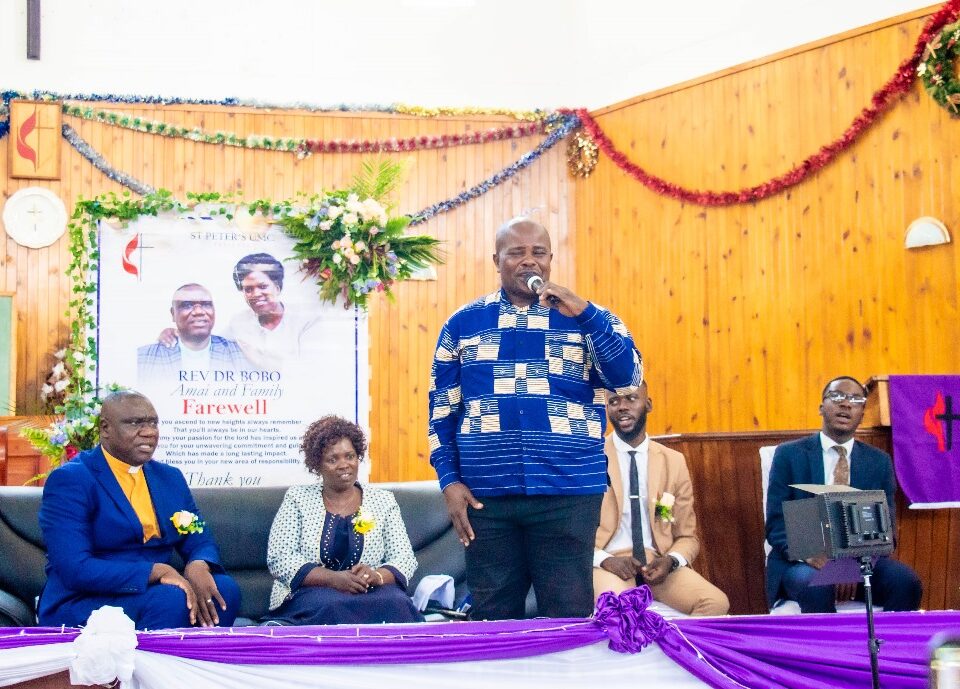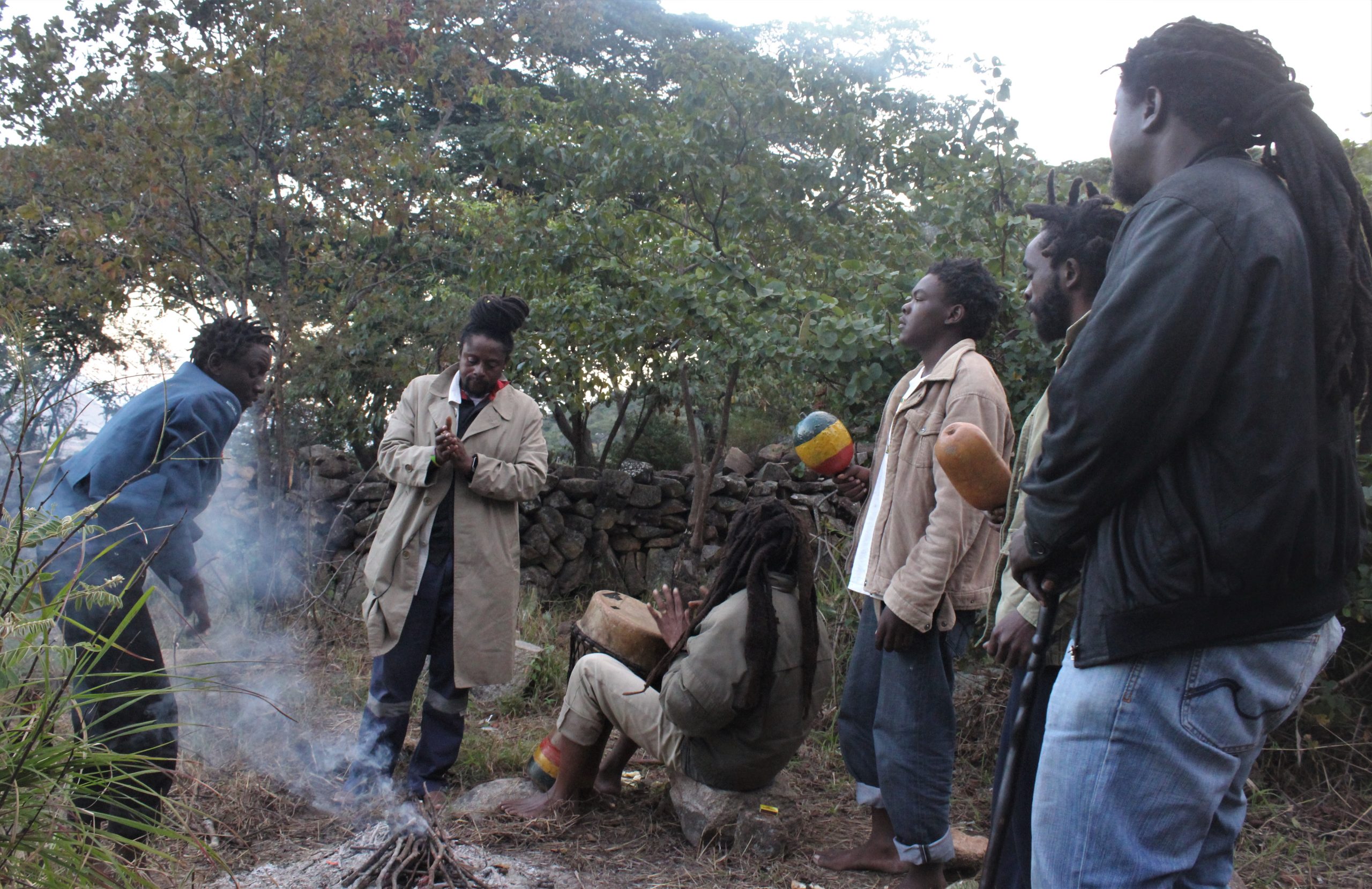
Zimbabwean Rastafarian’s untold life of environmental livity
March 27, 2019
Double delight entertainment tonight at Holiday Inn Mutare with Ntswai Ntswai and Reel Eeez
April 5, 2019Correctional service in Zimbabwe’s prisons, myth or truth?
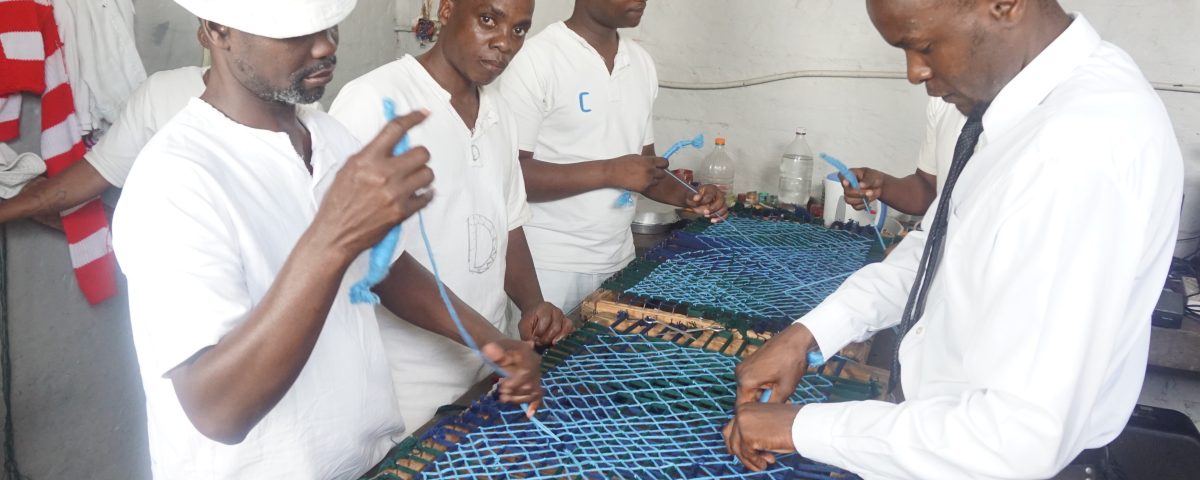
Prisons are viewed as centres of incaceration but the Zimbabwe Prisons and Correctional Services (ZPCS) says it is now a rehabilitation institution where convicted felons learn how to get another chance at life.
…Life behind Zim’s prison walls
Ngoni Dapira
IT’s a known fact and a common setup worldwide for prison life not to be ‘comfortable’ for inmates, however the perceived view that prisons are principally centres of incarceration is also not entirely true, especially in the 21st Century when the United Nations minimum rules on the treatment of offenders, better known as the Mandela Rules, are being diligently monitored by human rights watchdogs.
They were called Mandela Rules in honor of the former South African President Nelson Mandela who spent 27-years in prison for his political activism against the apartheid system. According to the United Nations basic principles of “Standard Minimum Rules for the Treatment of Prisoners” the safety and security of prisoners, staff, service providers and visitors should be ensured at all times. The rules are strict on keeping inmates safe from assaults as well as to ensure their entitlements to medical care, prohibit cruel and unusual punishment of inmates as well as sexual victimization or forced sodomy among many other concerns. However, though over the years, the Mandela Rules have served as a great guideline for humane living conditions for those incarcerated, the law itself isn’t legally binding. With no incentives for prisons to follow those guidelines they have often lacked luster on substance.
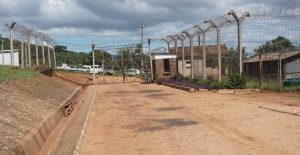
The entrance to Mutare Farm Prison.
In 2009 Zimbabwe’s prisons received a lot of bombardment over gross human rights violations, to the extent of being called ‘death camps’ by some critics, however in 2014 the Zimbabwe Prison Services (ZPS) rebranded to Zimbabwe Prisons and Correctional Services (ZPCS) and says it has been making frantic efforts to improve its operations regardless of limited fiscal resources and difficulties being experienced of operating under the unending economic upheavals. Eastern TimesZim recently toured Mutare Remand Prison and Mutare Farm Prison during a Mutare Press Club initiated media tour which was held in collaboration with Voluntary Services Overseas (VSO) Zimbabwe and other ZPCS partners. The media tour was meant to get first hand introspection of the state of Zimbabwe’s prisons and strides made so far towards the intended ‘correctional service’ of inmates.
There was a report made in 2016 by the constitutional rights body, Zimbabwe Human Rights Commission (ZHRC) which was tabled in the National Assembly in 2017. It monitored prisons in nine provinces of Zimbabwe and cited that the main challenges which were faced by the prisons emanated from financial constraints which affected ZPCS capability to cater for adequate food, bedding, clothing, sanitation and drugs of inmates.

Inmates inside Mutare Farm Prison.
According to the report, the acute resource shortages were a result of poor financial support provided to ZPCS from government, whilst the low quality of food was a challenge which was cross-cutting in all prisons monitored in 2016. In the report, both prisoners and prison officers confirmed that the diet was unbalanced as it mainly composed of starch and vegetables without proteins and other essential nutrients. Foods containers used for the serving of the food at most prisons were in bad taste and unhygienic, and the report said that violated the right to human dignity.
Up-to-date most of the country’s prisons are reportedly still struggling with overcrowding. Over the years, Treasury has been allocating insufficient funds to the correctional institution towards its medical supplies and other budget demands, which often left the ZPCS in a helpless situation to cut on so many necessities and resort to thinking outside the box, which is where partners from faith based organisations, civic society, business community and NGOs have come on board to ease the burden.
In terms of access to running water, during the tour, both Mutare prisons said they faced serious shortages of running water and there was no provision of adequate tanks to store reserved water. At Mutare Remand Prison they cited that their 10 000litre and 5000litre reservoir tanks were no longer functional and said the water from the local authority was not reliable.
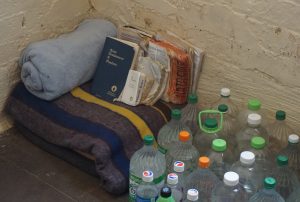
Inside the female holding cell at Mutare Remand Prison there were bottles of drinking water, bibles and clean blankets.
There was however a visible improvement contrary to what is often exaggerated in some media, as most inmates were in clean uniforms and well-dressed, though there were a few inmates in worn-out or oversize uniforms. In the 2016 ZHRC report, clothing shortages, bedding infested with lice and poor sanitation were common features raised in most prisons, but during the tour a different face was presented in the Mutare prisons depicting an improvement by ZPCS in its efforts to improve the welfare of inmates.
ZPCS Manicaland principal correction officer Liberty Mhlanga said as ZPCS their ongoing drive has been conscientisation of communities on their critical role in the rehabilitation of inmates, especially friends and family of inmates. He encouraged families not to neglect people because they went to prison. “As ZPCS our new thrust is that communities remain owners of our institution. We need the support of community for effective correctional service. Alone we cannot do it we need your help. If you have relatives in prison please continue taking care of them,” said PCO Mhlanga.
To sum up prison life, it is however not all gloom and doom — nor is it also just a world of rose-colored scenery, as there are also positives from inside the prison walls, where successful rehabilitation is taking place and some inmates leave prison with additional professional skills.
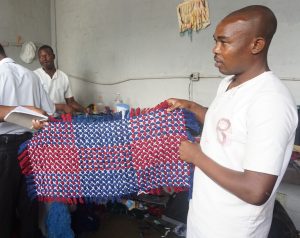
Jealous Tangwene shows off one of the mats he weaved.
Jealous Tangwene an inmate in Mutare Remand Prison who was in 2010 sentenced to 11-years for robbery said he had developed new skills of weaving mats in prison, which has now become his passion. “In prison I have learnt to weave and it is now my new passion. This keeps me occupied and I believe when I finish serving my jail time this will give me a new career option. Prison life is not easy. You can imagine, even for you when you are out there, if you are confined in one place I am sure it becomes nerve-racking. However, this has been a life changing experience for me which has helped me re-think about my life and I do not intend to commit another crime which will bring me back here,” said Tangwene.
As Tangwene bared out, indeed life in prison is hard. Although the remand prison was well cleaned, one could easily see that it was overcrowded from merely looking at the size of the holding cells against the number of inmates that were in the open space outside during the tour.
At Mutare Remand Prison, which is supposed to be a remand prison, the officer in-charge, superintendent Maplan Kakoto was quick to reveal that they were now forced to house convicted inmates instead of handling remanded inmates only, citing that all the regional prisons were jam-packed so they would be helping to decongest the provincial prisons by housing convicted prisoners.
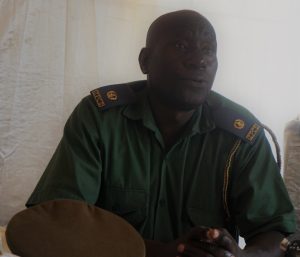
Mutare Remand Prison officer in-charge, Superintendent Maplan Kakoto
Supt Kakoto said in-line with the country’s constitutional requirements and the Mandela Rules, Mutare Remand prison was supposed to have an inmates capacity of 175, but it currently had 403 inmates, which means it was overcrowded with an additional 228 inmates.
“Most of the inmates are convicted prisoners… Currently only 89 are in remand. We are supposed to transfer the convicted inmates but most prisons are full already. Due to overcrowding, for us to be able to feed the inmates, provide clothing and blankets requires a lot of money and we are all aware of our economic situation. So this requires help from community and here we are glad we have partners that have been working well with us, who help us meet certain obligations and standards to meet the human rights standards enshrined in the United Nations minimum rules on the treatment of offenders better known as the Mandela Rules,” said Supt Kakoto.
Mutare Remand Prison which is one of the oldest prisons in the country, having been built in 1910, also houses female inmates. 31-year old Precious Nota who was sentenced to 10-months for robbery said they were being treated well and had no complaints about the life behind the prison walls.
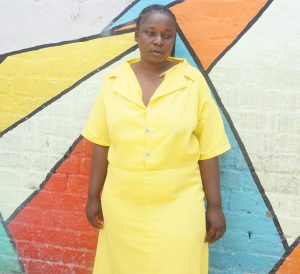
Precious Nota is one of the 24 female inmates currently at Mutare Remand Prison.
“We are being treated well and learning a lot in here. There are knitting and doll making programmes that one can take up. Although I miss my children, I can say the experience in here is giving me an opportunity to really reflect on my life,” said Nota who is part of the 24 female inmates currently at the prison. A glimpse in the female holding cell where there were neatly packed plastic bottles of water, blankets and bibles attested that indeed prison time gives inmates a lot of time to reflect and connect with their spiritual side. Of the 24 female inmates 17 were said to be convicted whilst 7 are in remand. Most of the inmates were reluctant to talk to the members of the press, and in respect of their rights, all journalists were cautioned to first seek consent for any pictures or interviews.
Supt Kakoto said given that Mutare Remand Prison was an old prison, there were poor living conditions for women with children, given the limited space for the children. He thanked their corporate partners that often help female inmates with under-garments and sanitary wear among many other supplementary items for special cases.
Given a free platform to air concerns to the media, one inmate at Mutare Remand Prison revealed drugs continued to be in short supply with painkillers such as paracetamol only in supply. A visit of the clinic at Mutare Remand Prison showed that they were in dire need of financial resources. It was revealed that there is only one doctor and seven nurses responsible for all the inmates, which was not proportional according to standard doctor-patient ratios.
“We appreciate you (media and partners) coming here and remembering us inmates. The way we are living in here is very tough. We get three meals a day but it is mostly starch and vegetables, which means there is no balanced diet… We are people as well just like you outside. This is where the stigma and neglect of convicted inmates starts… In terms of medication we only have paracetamols in stock. We are aware we committed crimes and we are facing punishment, but we also want to have a decent life in here, so that when we leave this place we will be fully rehabilated. This won’t happen if we are neglected and treated like animals,” said the unknown inmate who did not reveal his name.
He added that full rehabilitation could only be truly achieved if a decent life is ensured for inmates, especially on their nourishment and psycho-social support programmes. Supt Kakoto accepted that meat was difficult to provide regularly under the current economic upheavals but said they always guarantee inmates have three meals a day.
“Inmates are assured of three meals a day. The have porridge or rice with tea in the morning, sadza with vegetables in the afternoon and sadza with beans or with meat at times in the evening. We try to ensure that they eat meat at least four times a week in accordance with the regulations but our harsh economic times sometimes prevent us from meeting this guideline,” said Supt Kakoto.
It was however also worrying to notice that the juveniles, though they had their own holding cells, they were sometimes exposed to mix with the senior inmates during the day when they are out of their cells between 8am to 4:30pm. Mutare Remand Prison rehabilitation officer Makaita Mutare said their challenge during the day was limited space to separate juveniles from the senior inmates. She said the guards however try to look out for the juveniles and ensure they do not mix with the seniors by keeping to their own corner. She also revealed that of the seven juveniles’ currently in prison, only one had visits, whilst the rest had no family members coming to visit them, which is problematical to their rehabilitation process.

Mutare Remand Prison rehabilitation officer Makaita Mutare briefing members of the press and partners during the tour.
“Family visits help in the psycho-social programme of inmates. We also try to do home visits for juveniles but financial resources have been limiting this. We are however thankful to our partners that help us, especially those that help prisoners with transport money when they are released from prison,” said the Mutare Remand Prison rehabilitation officer
Reports of rampant sodomy in exchange for food or favours and rape in some cases have also been raised in the country’s prisons, but Supt Kakoto said at Mutare Remand Prison there were no reports of sexual violations by inmates which means it was not happening in his prison.
At Mutare Farm Prison the deputy officer in charge, chief correctional officer Wallace Mbanje also revealed that they were currently overcrowded with 414 inmates housed there. This exceeded their holding capacity of 320 inmates. They have several self-sustaining practical skills programmes offered at Mutare Farm Prison.
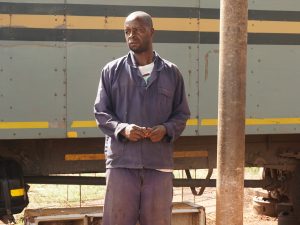
Patrick Madzinga
The story of 45-year old Patrick Madzinga from Masvingo also inspired many in really telling the correctional service story. Madzinga who is an accountant by profession was in 2013 convicted to seven years for armed robbery. He is now a qualified class one auto electrician tradesman and is in the process of completing his class one motor mechanic industrial training and trade test if he gets $125 (RTGS) for his practical examinations. The father of three who claims he was wrongfully convicted however said he was grateful he had attained new skills that he hopes to put to good use when he gets out from prison next year.
“I was innocent of the crimes I was convicted for but my prison sentence has also come as a blessing in disguise. I have rediscovered myself and have attained new skills. I look forward to getting out next year and reunite with my family,” said Madzinga.
Another inmate who seemed to be very popular among the inmates at the Farm Prison, Charles Matondo, was given a chance to address the media about their life inside the prison walls. He called himself a chess master and challenged any opponents anywhere in the world that wanted to play against him. He urged the community not to shun inmates but interact more with them through sporting games citing that it helped in their rehabilitation process to know that they were not considered outcasts.
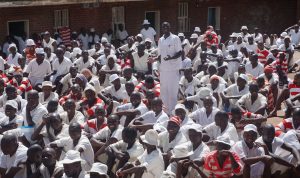
Charles Matondo (standing) who calls himself a chess master explaining how inmates need the community outside to forgive them and integrate with them to help their rehabilitation process.
“There are people with natural talents in prison and another chance should be given to us as we are trying to turn around our lives. I am a chess master and an artiste whilst others are talented soccer players, but sadly we have no soccer balls for our Prison Inmates Football Association (PIFA) programme which was started in 2017. We want boozer soccer teams to come and play with us and give our talented players exposure,” said Matondo who afterwards sang a freestyle song to prove his musical talent., of which he did not disappoint as he received a loud applaud from fellow inmates and everyone who was present.
Mutare Farm Prison chief correctional officer Joseph Sasa who is in-charge of the tailoring, construction and automotive workshops said there were a lot of inmates that have over the years left with certificates and life-skills which gave them a starting point. He said imprisonment was a huge punishment alone, so their correctional service programme of imparting professional life skills ensured sustainability of inmates rehabilitation to live a crime free life after serving their sentence.

ZPCS Manicaland principal correction officer Liberty Mhlanga (extreme right) addressing guests during the Mutare Farm Prison tour.
PCO Mhlanga thanked the corporates and non-governmental organisaitions such as the Prison Outreach and Reintegration Association (PORA), Gogo Olive, Zimbabwe National Network of People Living with HIV (ZNNP+), Double Harvest, Timber Products International (TPI) and VSO Zimbabwe for their support and prison programmes which were helping to make their inmates rehabilitation programmes achievable. ZNNP+ initiated a poultry project at Mutare Farm Prison, as a joint income generating project to supplement the diet of inmates, especially for the special needs of HIV positive inmates. PORA, a Seventh Day Adventist Church association as well as Double Harvest under the Victory Tabernacle Church, that both run psycho-social support and bible fellowship programmes were also mentioned as special all weather partners.
There was also Gogo Olive which runs a dolls knitting project for inmates as well as TPI which was the pioneer in Zimbabwe to open its doors in 2010 in support of the rehabilitation programmes initiated by ZPCS to send inmates to work outside for practical, hands-on work experience. At TPI the inmates get the opportunity to learn the trade of manufacturing doors and timber moldings at the same time earning a bit of money which can help their families whilst a portion of their wage also goes to the prison. Mhlanga said TPI paved way for other companies like Allied Timbers that now support the programme.
VSO Zimbabwe project officer George Matende said the prison population also has inmates with HIV and other chronic diseases that need special consideration. He said to help combat the HIV and AIDS pandemic, they were working with the ZPCS, local government departments and NGOs in six prisons in Harare, Mutare, Bulawayo and Masvingo, to help improve the quality of life for vulnerable prisoners infected or affected by the disease. He said their interests were on nutritional support and advocacy issues to ensure the Mandela Rules were observed in prisons.


